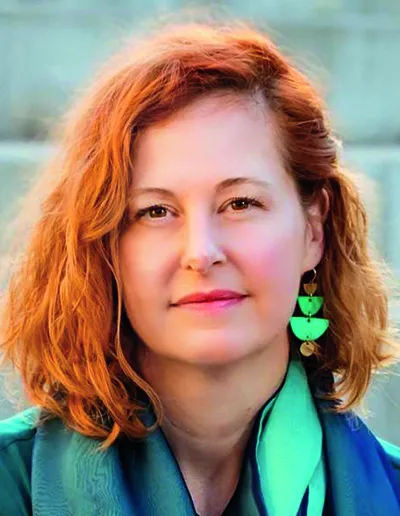'This is a people business. Get out to the people.'

On The Distinguished Alumna Award
I told Tom walking over here that I knew I have been asked to speak to you all, but I was unaware that there was going to be an award involved. And I kind of had the same reaction to that you see in the Three Stooges, where they come into a room– it is usually a lawyer’s room, a conference room– and the lawyers stand up and say, “Gentlemen! Gentlemen!” and they turn around to see who is coming in. That is how I feel about this.
The Setting
Because let me tell you something: I have sat in this Chapel. I have sat in this Chapel as a graduate of the Law School. I have sat in this Chapel as a family member—a mom and also an aunt. And I have sat in this Chapel now as a speaker, which I regard as a sort of revenge, but the best role was actually being the family, being the mom.
So really, before I start digging into these graduates, congratulations to you family members out there. You really did the work. Nice job.
Introduction
And now I will tell you that when Tom Miles asked me to speak, I said “yes” without reflecting at all on what I might say. As a trial lawyer and as a mom, I seize the mic whenever possible. In my view, he who pauses is the listener. But having accepted, I developed anxiety for two reasons:
First, it came to my attention that here at the university I will be followed by a faculty speaker, who this year really, someone save me, is Frank Easterbrook, who has the advantage, so many advantages, but the one that I focused on was the advantage of knowing this audience of students, who have been in the years-long habit of paying to listen to him, whereas in my practice, judges and jurors listen to me only because they are paid to do so by taxpayers, and witnesses listen to me only because they are under subpoena.
Second, I remembered that most graduation speeches give advice, right? So they thus combine the qualities of being platitudinous with being unmemorable. Think of Shakespeare’s Hamlet, when Polonius gives advice to Laertes who is about to embark, who is leaving: imminent departure for foreign lands and studies, to which we owe such memorable observations as “Neither a borrower nor a lender be” and “Give every man thine ear, but few thy voice,” and “To thine own self be true. . . . ”
But I got over these concerns, and I am here to give you advice, which I learned to do best as a mom actually. Like my kids, you might find some of it mildly interesting. You will definitely find some of it boring. And you will certainly forget it within a week. (Why should you be different from the children?) Nonetheless, I am invested in you because you now graduate from the same remarkable Law School that I did and that enabled me as you now have been enabled. And you look like a fairly promising bunch to me: I think you are going to grow up to be quite influential. Movers and shakers, as they say.
So, I have decided to tell you what I think, and it would not surprise you that my children could never stop me either.
So, I am going to talk first about the beginnings of your soon-to-be-remarkable careers, where you will have a chance to do things in the external world that will allow you to become a legend in more than your own mind. Second, I am going to talk about the long view—for you and the world. (This won’t take too long.)
The First Few Years
Now, the first few years, the beginning of your careers, you will struggle to appear to know what you are doing, to hide your fear that you are about to irretrievably screw it up. You will reverberate like a pneumatic drill—at least inwardly, hopefully not outwardly and visibly. And you will learn to appreciate the perspicacity of the observation—I think by Yogi Berra—that in theory, there is no difference between theory and practice, but in practice, there is. In short: what is about to happen to you will be nothing like Law School.
Now, during this time, a small voice (not always small) inside you will insistently say: “Stop it. Stop it now. Don’t volunteer for—fill in the blank—this or that assignment. You have never done that before. You don’t know how to do it and you don’t know what you are doing.”
And my advice to you is: turn down your hearing aid. Do the stuff that you have never done. If you’re gonna be a trial lawyer, sign up to dig up the facts, find the witnesses, read the documents, get the evidence, cross-examine whomever you must. If you are going to be a deal lawyer, get into negotiations, walk the client through the deal decision points that have been worked out so far.
This is a people profession. It’s even supposed to be a helping profession. So get to where the people are—the clients, the courtrooms, with the judges and the jurors and the bailiffs and the court reporters (make friends with the last two of these, they really are the most important people). Go where the facts are, whether at companies or in government. Like they say in Hamilton, get into “the room where it happens.”
Do not, do not, hide out in your office, writing nasty legalistic letters or swapping endless drafts of briefs or deal documents with your erstwhile classmates who are soon-to-be adversaries or cocounsels.
Do not write endless legal research memos that are like nautilus shells, with a whirl in the center that is symmetrical, and make me think of the sea and lead to nowhere in particular.
Do not make endless “work stream lists” for projects or deals that you hope that no one will actually ask you to do.
Do not become the go-to person for the cut-and-paste of prior due diligence or ancillary deal documents.
Do not form the view that staying in your office is the best (or only) path to becoming a judge, provided that you can work in a little politics. Too many judges today first saw the inside of a courtroom when they were being measured for their robes, and in my view that is buggering up a lot of things.
This is a people business. Get out to the people. You get the idea?
Now, as I said, this will make you anxious. And this just in: That anxiety will never go away, because if you are doing the work right, what you are doing is important to the people with whom you are interacting—to your clients, it will be unbelievably important. You will be all that stands between them and dishonor or loss of funds or loss of liberty. They will arrive to see you—plaintiffs, defendants, whomever—at best they are misunderstood and at worst they are in so much trouble it is not clear that you are able to dig them out of that hole. But, what you are doing is important, so you will always be somewhat anxious about it, even after you are experienced.
But here is the good news, you will still get butterflies in your stomach when you go into the courtroom, when you pick the jury, when you go to negotiate the deal, when you stand up in the Supreme Court—but the butterflies will fly in formation.
For those of you brimming with confidence (and I know you are out there because my son graduated from the Law School and he was one of you), I have different advice, and for that I have only an illustration from the great French actress Sarah Bernhardt (look her up if you don’t know who she is).
Sarah Bernhardt was a martyr, a martyr to stage fright. She would stand in the wings before every performance, throwing up in a bucket. One day, or evening, she was doing this before going on as Phaedra (or whatever). And, she was standing next to two supernumeraries. You know what supernumeraries are? They are those people in the play or the opera who march in carrying spears and wear helmets with fringes and with broom bristles on the top, and then they hold the spears when they stand in the back and say nothing. Those are supernumeraries. She was standing next to two supernumeraries, one of whom said to the other: “I never get stage fright,” and Bernhardt turned around and said, “Don’t worry. When you’re good, you will.” Remember that. You get the idea.
Now I do not say that taking these risks, pushing yourself, means you will always succeed. It will be messy. You won’t always succeed. But it is good for you. It will teach you to fail. It will teach you to lose. It won’t kill you. You will get up one more time than you are knocked down. And that actually is the essence of being a champion, and it is certainly the essence of performances in courtrooms. You can’t climb into the ring without getting punched in the face, at least occasionally. But you just hope that when you’re finished, all the blood on the floor isn’t yours. Doing this, among other things, will teach you, if you haven’t already learned from the many experiences you have had, to be resilient. And it will teach you to be hard on your opinions, because you are going to find out how often you’re wrong. It is not a straight line from God’s lips to your ears. So, question your conclusions, your biases, your privilege, your arguments. This will save you in a lot of ways, make it likely you will win over time. Try to remember what Mark Twain said, “It ain’t what you don’t know that gets you into trouble. It’s what you know for sure that just ain’t so.”
Take the risks. Go out there. Fight. Win. Lose. Survive.
The Longer View for You, and the World
Now, switching to the longer view, whose relevance is immediate (so don’t fall asleep), but more enduring, because some things haven’t changed, although some things have, although not nearly enough, so listen up.
Here are the things that have changed at least in the microcosmos of this Law School.
I graduated almost half a century ago. I came direct from sixth grade. Jimmy Carter was president. No lie. The first Star Wars movie was released my final week of third year. I went to see it after my creditor’s rights exam.
And when I graduated, the faculty here was 100 percent white, 100 percent male, and I am quite sure they had all completed their orthodonture. The student body was mostly a mirror of that Law School faculty: almost all of them were white, almost all of them were male, and all had bright, shiny smiles. In my class, less than 10 percent of us were women; less than 1 percent identified as persons of color. I mean, there was one person. I guess we were admitted because we also had the orthodonture thing down. So we met two of the three requirements for getting in.
But today things have changed. The faculty is 60 percent male and 40 percent female; 12 percent identify as persons of color. Today, the student body is only half male; the remainder being women and other. And 37 percent of students identify as persons of color.
I would call this a good start. But there is still a long way to go, and I hope you all will continue to press for—to lead—change.
Because, in your roles, even in this advanced, changing, progressing world, you should each bear in mind: one thing you know, you got here—in part—by being very intentional. You are very intelligent. You are very hard working. That’s why we are congratulating you and that’s why we are celebrating your achievements today. You have been very intentional about your life so far—it hasn’t been all beers at Jimmy’s or Ida Noyes’s pub, or Thursday nights out at Bar Review. Nor have you only been hiding out during the pandemic; you are back in your rooms in front of your computers, working.
But recognize: you should be very intentional now about what you set as your lifelong goals. And that is because, more than almost anyone on the planet, you are likely to reach those goals.
This is true for a whole bunch of fortuitous reasons, which is the fancy way of saying: you are all incredibly lucky.
You are lucky to live in in a mature, if challenged, worldwide empire—one of only two on the planet.
You are lucky that this empire is the one that is a democracy governed by the rule of law. (At least currently. You all are going to have to work on that. Don’t laugh.)
You are lucky to have abundant social capital: the human network of your classmates and your teachers and professional mentors who accompanied you thus far and who will remain in your life, if you treat them well.
You are incredibly lucky to have been born into a nice family who encouraged you to succeed in all you did and who helped you to get educated, to go to Law School and college and all.
Or if you were born into a not-so-nice family, you are still lucky in that you happen to be made of the sort of DNA that brought you to this place where you eventually got educated, went to college, and graduated from Law School.
So you pulled yourself up by your bootlaces, as they say. But you are still lucky, ’cause you did not make your DNA. And those were not even your bootlaces. So, you are now capping this long string of incredible luck with finishing your professional education and getting an prestigious and enabling law degree.
And you are likely to accumulate a lot of power and authority as a result of all that luck.
Try to remember this as you all move forward.
Because it should spur you to some particular conduct in this world, which brings me to really the last part of my advice.
Which is: given all this good fortune, this luck, you will not be surprised that I profoundly wish for you that you remember and bear in mind in the heights of your astonishing success that you are like a turtle in a tree. You didn’t get there by yourself. And so, this means, in turn, you must lift while you climb. You must, as they say, give back.
You could give back to those who are on the same path. I understand that about 80 percent of you got some scholarship help here. You could start with that, for example. But, you should also give back to the world that has made you so fortuitously privileged.
Especially as you are lawyers, you are gonna have lots of opportunities to do this. Why? Because law is often used by the powerful to oppress. This may have come to your attention. You can change that. You can spend some—or all—of your time, your brains, and your energy to comfort the afflicted and to afflict the comfortable.
What do I mean when I say comfort the afflicted? Back to the people business. Go to the border crossing and the immigrant detention center. Go to the prison. Go to the homeless shelter. Go to domestic violence shelter. As one lawyer who works all the time (full time) in such venues told me: “Prayers help, but prayers and a lawyer help more.” There are a lot of folks who need lawyers to represent them: energetic, creative, smart lawyers, like you.
And afflict the comfortable because there are government agencies, legislatures, and especially private actors that make mistakes and use or break the laws to wound the planet, to damage the environment, to injure public health, to keep kids out of school programs because they are different, or to deny people access to pretrial release, or to expose people to violence in their schools or in supermarkets, or in hospitals, or to deny people access to the ballot or access to health care. I know, whether or not you agree abortion is health care, whenever a government makes a decision about who gets care—whether it is family planning or vaccination or hospitalization when ill—this matters. It matters to the health of society and it should matter to you.
You can do something about all these things because whatever your politics or your social values, you have the skill sets, the brains, the energy, and the social clout to do something about these issues.
So don’t spend all your time making the world a safer place for the Fortune 500, or Big Tech, or robber baron tech disrupters, or the parasitic remora who hang on their shark-like sides: the private equity investors, corporate raiders, and big financial firms. And don’t hang around too much with their kissing cousins: prosecutors and powerful government officials. Just to mention a few of the people who will rove the halls you will soon occupy: major law firms and companies and legislatures and state houses and city halls and government offices.
These are the persons you may become, especially if you don’t leaven your life with some public service. Although I should say that if you came just for the money, you missed the turnoff at 57th Street for Booth. And you can see what my view is: don’t just be their lawyers. Okay? You can do more than help this nation decide which group of middle-aged guys gets to keep the money. Because it is not true that money is life’s report card, and it is not true that power is life’s report card. As Einstein said: “Try not to become a person of success, but rather a person of value.”
For Now and Always: What Would It Mean to Be a Person of Value?
So, as the years go by, you will get two things out of taking my advice, at least two. (The children haven’t done it so far but I have not given up. My mom says I haven’t broken their spirit, but I haven’t stopped trying either.)
First, the amount of satisfaction you will get if you lift up others while you climb is immense. Whatever the world gives you in power and treasure because of your accomplishments will be dwarfed by how good it will make you feel to be in the end of this business that involves justice and fairness and making the world a better place.
Second, as your power and authority and stature grow, try to remember that what is allowed is not the same as what is wise (let alone what is good). Because as you get older and more and more experienced, you will be in the position to advise people on grey areas. The decision is the clients’, but their decision should be informed, and the information comes from you. And the question will be not what is allowed, but what is wise. You will get the ability to give advice on that subject but you are gonna have to work at it by having the values I talked about and engaging in the conduct I described.
Conclusion
So, be prepared to navigate those grey areas as you get older and to give that advice. To treat everything, all the client matters, as though they are really important, ’cause it is to them. To deal with the butterflies in your stomach and to enjoy this hard and good work you are about to do. I am going to close by saying to you what I used to say to the kids when I sent them off to school every morning, (which is something I actually stole from a Spartan mother when she sent her child off to battle): “I have told you what I can. Now, come back with your shield—or on it.”


